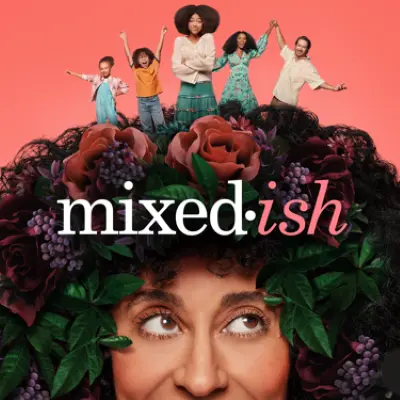Mixed-ish has a great cast, but it has yet to figure out how to fit them together in a satisfying way
-

"Tika Sumpter is radiant as Rainbow’s mother, Alicia, but it’s hard to buy into the character given how quickly she goes from wanting her children and family to be 'above race' to realizing how impossible that is," says Angelica Jade Bastién of ABC's Black-ish prequel spinoff. "Sumpter and Mark-Paul Gosselaar, as the family’s idealistic patriarch, Paul, share flashes of easygoing charm, but the chemistry between them hasn’t gelled. Worse yet is Gary Cole, an actor I typically like but who is saddled here with playing a blunt caricature of a Republican who says lines like 'This is why I don’t do cocaine. I am cocaine.' That the character has any impact at all is thanks to Cole’s skills as a comedic performer. But like so much about the premiere — from its too-clean set design to its too-clean outlook on race — it only half works, at best."
ALSO:
- Mixed-ish oversimplifies the truth of what it's like to be black in a commune: "While the weekly lessons on Black-ish have sometimes had an airy tone, the series made a point to acknowledge and confront recognizable themes like self-identity, diverse Blackness and racism," says Candice Frederick. "So it’s strange to watch its new spinoff, Mixed-ish, completely abandon the original series’ acute awareness for the sake of a comedy that oversimplifies the truth about what it means to be Black in a commune." Frederick adds: "It’s already absurd that two parents who were so cognizant of the racism that pervades the outside world would have never had a conversation about race with their kids. But it’s even more astonishing that a franchise like this would perpetuate a prevalent false image in pop culture imagining that communes, which are mostly inhabited and run by white people, are completely ignorant of race."
- Mixed-ish gets being mixed-race right: "It took me years to understand that the two halves of my identity weren't two separate pools I could jump into at any given moment, but that I was a blend of the two cultural perspectives and narratives, as are Bow and her siblings," says Megan Vick. "There's strength, resilience, and pride that comes from being a person of color in America, but also an unconditional compassion inherited from our white parents that literally loved our light brown skins into existence. That dichotomy is complicated and nuanced, but it is what I hope Mixed-ish leans into unabashedly in its first season. From the first episode, it looks like Mixed-ish, in the same vein of its predecessor black-ish, has all the ingredients to tackle those difficult grey areas in a smart, articulate, and funny way. What's most exciting is that they have the runway to explore issues through a unique lens that we haven't really seen on television yet, especially not on broadcast. It's something I, as a mixed race person, am so excited to see."
- Black-ish has been very layered when it came to race and identity, but the same can't be said for Mixed-ish: "It’s hard to predict the trajectory of Mixed-ish based on just one episode," says Shannon Miller. "There’s plenty of room for the series to grow and a lot of the episode’s shortcomings could have everything to do with it being a pilot. But as a first look into this new world, it’s amusing at best and underwhelming waste of incredible potential at it’s worst. Like Bow, I’m stuck in the middle, waiting to see how this all turns out."
- Mixed-ish has a decent first episode, but it deserves more of a chance to explore its potential: "I'm more inclined to give Mixed-ish some leeway because the young cast and a sense of the show's overall purpose are hard things to come by," says Daniel Fienberg. "There are a lot of conversations about race that an 1980s period setting can open the door for, and t"hat can include DeBarge jokes. But Mixed-ish probably shouldn't rely quite as exhaustively on pop culture unless it's just going to be a less frivolous version of The Goldbergs, a show that does what it does reasonably well and doesn't necessarily require replication."
- How did mixed-race Mark-Paul Gosselaar -- who is of Dutch and Indonesian descent -- approach Mixed-ish?: "Being someone who is mixed, I never had to think about it until it was brought up, because of the way I looked," he says. "I was arguably America's favorite white boy at one point, and it's like, 'Wait, that guy is mixed?' It's one of those things that because of the way I looked I didn't have to deal with it. It's a conversation I have had and I do have with my kids because they are—as well—mixed."
TOPICS: Mixed-ish, ABC, Black-ish, Arica Himmel, Gary Cole, Mark-Paul Gosselaar, Tika Sumpter
More Mixed-ish on Primetimer:- A Brown-ish Latinx-themed comedy from Black-ish creator Kenya Barris and Eva Longoria is in the works at ABC, but Old-ish appears to be dead
- ABC cancels American Housewife, Mixed-ish, For Life and Rebel
- TV Today: ABC's Big Sky Looks to Keep Up the Momentum in Its Mid-Season Return
- Mixed-ish creators sued for allegedly stealing the ABC comedy's concept
